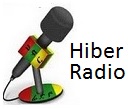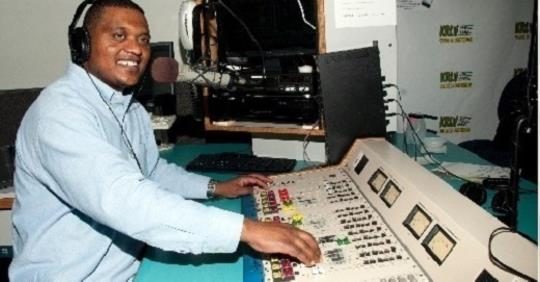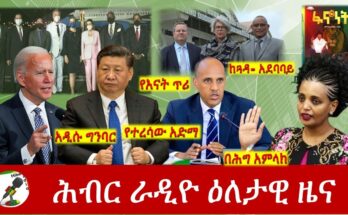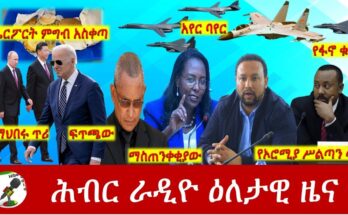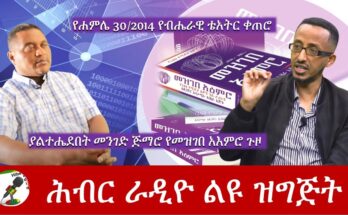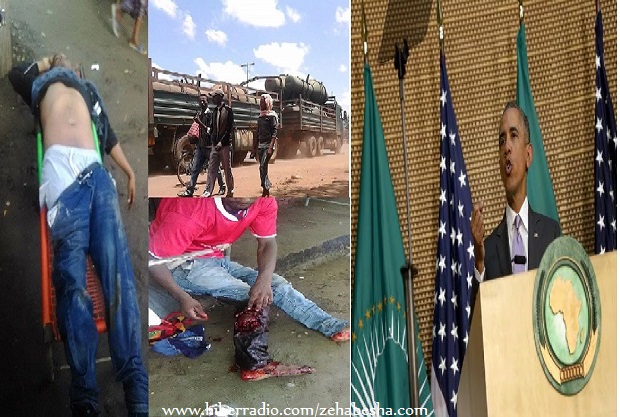
Press Release
September 2, 2016, Washington, DC
Ethiopia is teetering on the edge of a full-scale catastrophe. The TPLF/EPRDF regime, one of the most repressive, bloodthirsty dictatorships in the world is panicking and its leader Mr. Hailemariam Desalegn, has officially declared war against the people. As hundreds of thousands of Ethiopians in the Amhara and Oromia regions protest against the repressive policies of the current Ethiopian dictatorial regime, one ethnic minority-led regime has responded with escalating violence against peaceful protestors, leading to the death of nearly 1000 civilians from the Oromia and Amhara regions, since November 2015. Many of the victims are young teens and even children as young as 4 years old. Over the past week only, it is estimated that regime-controlled security forces shot and killing at least 153 civilians in Amhara region. The ethnic apartheid regime of the TPLF/EPRDF must top killing the people.
Many Ethiopians worry that the situation could easily explode into genocide in Ethiopia, Amhara and Oromia, pushing Ethiopia over the edge to become another failed state in the Horn of Africa. Some fear that the most likely initiators of a possible genocide would start with the TPLF due to their fear of losing control and their determination to hold on to power and all they have acquired through it. Furthermore, brutal force and violence are a familiar part of their history and they have the military capability, intelligence, and resources to do it. If the TPLF leaders panic, especially because they are a small minority group, and up the violence and killing; the people will easily respond, escalating the violence to a scale of genocide that could bring the country down. We the people of Ethiopia seek to avoid this scenario through talking to each other rather than about each other— a genuine dialogue between the people—that would lead to reconciliation, restorative justice and meaningful reforms.
Actions or inaction taken in the next days, weeks and months may determine which direction it will go. Countries like Libya, Syria, Yemen and now South Sudan provide disturbing images of the kind of disintegration we seek to avoid in Ethiopia. Most would agree that the costs to the people and resources of a country are much less or even avoidable the earlier one intervenes. It is too late to change the course of destructive events in these other countries, but it may not be too late to do so in Ethiopia. There may be a short window of opportunity and that is the purpose of this letter.
We, in the Solidarity Movement for a New Ethiopia (SMNE), a non-political, non-violent social justice movement of diverse Ethiopians, have been warning those in the international community for the past year or more regarding the strong likelihood that the hard-lined policies of the regime could become the source of their own instability. It appears to be happening. A deep concern is that it may soon be too late to de-escalate the present situation since the TPLF/EPRDF violence has already served as a rallying cry for others to join. Even if opportunities to intervene are taken, the situation still could easily explode into widespread violence, chaos, and instability in this strategic country in the Horn of Africa.
To make matters worse, allegedly, the TPLF/EPRDF has warned Western embassies in Addis Ababa against making any public statements or releasing any information regarding the uprising. Reportedly, members of the embassies were told that news of the uprising could result in turning Ethiopia into another Syria. It is amazing how the TPLF/ERPDF’s aversion to information has reached to the US, the UK, the EU and others, in an effort to silence them. This may explain why since it started; there has been no condemnation of the killing or calls for restraints from anyone in the West.
The international community, especially donor countries, can make a dangerous miscalculation by becoming complicit with the TPLF/EPRDF through their silence. Instead, this apartheid regime of the TPLF/EPRDF should be condemned for the brutal killing of these unarmed students who were not threatening violence.
Despite the efforts of the regime to suppress the information, news of what is happening is spreading quickly and broadly through the social media. The documentation is not lacking, but abundant, as graphic images of new victims of regime atrocities circulate online on an almost hourly basis due to access to new technology. People can identify the victims and their names. Pictures of the dead and wounded are shown next to their past pictures. The majority has died by the bullet from federal security agents. The images are unimaginable.
Because some of the police are taking off their uniforms and joining the people, the TPLF/EPRDF are now blocking roads from public use, while using helicopters to drop off security agents in these regions where they are committing more human rights atrocities. Now, it is reported that the Amhara and Oromia regions, previously under the control of two of the four ethnic-based parties making up the EPRDF coalition, the Oromo Peoples’ Democratic Organization (OPDM) and the Amhara National Democratic Movement (ANDM) has lost its regional authority. With all of these things happening; as of today, it seems the problem is getting further and further out of hand.
Right now, the conflict is being played out between increasing numbers of mobilized troops with guns and the local people who simply want their rights. At present, it is an uprising contained within the Amhara and the Oromia regions, comprised of mostly Amhara and Oromo and led by people on the ground; but, if it expands into a nationwide protest, it may be difficult, if not impossible to contain. For donor countries to remain silent out of fear could easily trigger greater instability. It is an unsustainable position. In fact, silence from donors, especially those who promote democracy, peace, non-violence and the rule of law, could backfire as Ethiopians see all avenues to change blocked, making it necessary to take the matter into their own hands. Key stakeholders must be aware of this. The crisis should be contained rather than be ignored.
The US, the UK, the EU and others foreign policy of delaying action until a situation or country explodes has not worked in many cases, like in South Sudan where proactive intervention could have prevented what is now going on. In the case of Ethiopia, donor foreign policymakers have been reluctant to confront the unjust ethnic apartheid system of government in the country for fear of creating instability; however, ignoring its basic nature is actually going to also backfire; and when it does, the poor people will be the victims. Based on all these things, we call on the Obama Administration and other donor countries to openly condemn the repression and violence and to use your leverage as a means to bring about a dialogue leading towards a meaningful and sustainable solution in the best interests of all the people. This should include objective media coverage.
The people of Ethiopia are already working to find a way to collaborate together in building a better future for all the people. Once this is achieved and it becomes a nationwide effort; the TPLF regime will be done. This is a time to side with the people instead of with a dying regime. Support for an autocratic regime, while speaking the rhetoric about caring about Ethiopian’s democratic and economic development, must change.
Recommendations:
1.We call on the Obama Administration, the UK, the EU and others donor countries to publically make a statement condemning the killing of the innocent people and to use your leverage to press for a dialogue leading to democratic change.
2.We call on the TPLF/ERPDF regime to demonstrate restraint and stop the killing of the people
3.We call on the TPLF/EPRDF to release all the people arrested as well as other political prisoners.
4.We call on the TPLF/ERPDF to open access to roads, blocked by national defense forces, making it possible for people to travel within the Amhara and Oromia regions
5.We call on international human rights groups to become involved.
6.We call on the people of Ethiopia to work together, including protesting together in a peaceful, non-violent manner. Avoid making this a tribal protest or a tribal issue as this is about freedom, justice, equality, good governance, freedom of expression, freedom of assembly, the rule of law and upholding the human rights of all our people.
7.We call on Ethiopians to start talking to each other rather than about each other; putting humanity before ethnicity or other differences and caring about the rights, freedom and well being of all our people for no one is free until all are free.
Let us reject ethnic-apartheid ideology TPLF/ERPDF and ethnocentric groups where one ethnic group or a few elite thrive at the expense of everyone else while the majority struggles to survive.
Let us join together in using this powerful symbol of non-violent protest; not for one ethnicity, but for all of us Ethiopians. As we cross our arms and bow our heads, let us to pray to God for the transformation of our hearts, souls and minds and for the wisdom, generosity, integrity and fortitude to build trust among ourselves so we might create a new and true government of the people, by the people and for all the people.
May God protect Ethiopians from choosing the wrong paths that will inflict harm to others and may lead to our mutual destruction.
